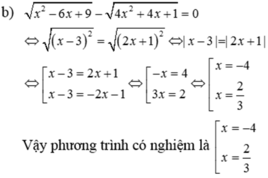Giải phương trình: (x2 - 6x + 9)3 + (1 - x2)3 + (6x - 10)3 = 0

Những câu hỏi liên quan
Giải phương trình: (x2- 6x + 9)2- 15(x2 - 6x + 10) = 1
Giải phương trình: (x2- 6x + 9)2- 15(x2 - 6x + 10) = 1
Giải các phương trình sau:
g/ x(x + 3)(x – 3) – (x + 2)(x2 – 2x + 4) = 0
h/ (3x – 1)(x2 + 2) = (3x – 1)(7x – 10)
i/ (x + 2)(3 – 4x) = x2 + 4x + 4
k/ x(2x – 7) – 4x + 14 = 0
m/ x2 + 6x – 16 = 0
n/ 2x2 + 5x – 3 = 0
\(m,x^2+6x-16=0\)
\(\Leftrightarrow x^2-2x+8x-16=0\)
\(\Leftrightarrow x\left(x-2\right)+8\left(x-2\right)=0\)
\(\Leftrightarrow\left(x+8\right)\left(x-2\right)=0\)
\(\Leftrightarrow\left[{}\begin{matrix}x+8=0\\x-2=0\end{matrix}\right.\)
\(\Leftrightarrow\left[{}\begin{matrix}x=-8\\x=2\end{matrix}\right.\)
\(n,2x^2+5x-3=0\)
\(\Leftrightarrow2x^2-x+6x-3=0\)
\(\Leftrightarrow x\left(2x-1\right)+3\left(2x-1\right)=0\)
\(\Leftrightarrow\left(x+3\right)\left(2x-1\right)=0\)
\(\Leftrightarrow\left[{}\begin{matrix}x+3=0\\2x-1=0\end{matrix}\right.\)
\(\Leftrightarrow\left[{}\begin{matrix}x=-3\\x=\dfrac{1}{2}\end{matrix}\right.\)
Đúng 2
Bình luận (0)
\(k,x\left(2x-7\right)-4x+14=0\)
\(\Leftrightarrow2x^2-4x-7x+14=0\)
\(\Leftrightarrow2x\left(x-2\right)-7\left(x-2\right)=0\)
\(\Leftrightarrow\left(2x-7\right)\left(x-2\right)=0\)
\(\Leftrightarrow\left[{}\begin{matrix}2x-7=0\\x-2=0\end{matrix}\right.\)
\(\Leftrightarrow\left[{}\begin{matrix}x=\dfrac{7}{2}\\x=2\end{matrix}\right.\)
Đúng 2
Bình luận (1)
Xem thêm câu trả lời
Giải phương trình:
x
2
+
2
x
-
3
x
+
6...
Đọc tiếp
Giải phương trình: x 2 + 2 x - 3 x + 6 x - 3 = 0
Điều kiện xác định: x ≠ 3.

Suy ra: (x2 + 2x) – (3x + 6) = 0
⇔ x(x + 2) – 3(x + 2) = 0
⇔ (x – 3)(x + 2) = 0
⇔ x – 3 = 0 hoặc x + 2 = 0
+ x – 3 = 0 ⇔ x = 3 (Không thỏa mãn đkxđ)
+ x + 2 = 0 ⇔ x = -2 (Thỏa mãn đkxđ).
Vậy phương trình có tập nghiệm S = {-2}.
Đúng 0
Bình luận (0)
ho phương trình 2x^2-6x-3=0 không giải phương trình hãy tính x1,x2 với B=3x1x2-x1^2-x2^2
\(2x^2-6x-3=0\)
\(\Delta'=\left(-3\right)^2+3.2=15>0\)
⇒ Phương trình có hai nghiệm phân biệt với mọi m.
Theo hệ thức viét ta có : \(\left\{{}\begin{matrix}x_1+x_2=3\\x_1.x_2=-\dfrac{3}{2}\end{matrix}\right.\)
Ta có : \(B=3x_1x_2-x_1^2-x_2^2=-\left(x_1+x_2\right)^2+5x_1x_2=-9+5.\left(-\dfrac{3}{2}\right)=\dfrac{135}{2}\)
Vậy \(B=-\dfrac{135}{2}\) với hai nghiệm phân biệt thỏa mãn.
Đúng 1
Bình luận (2)
cho phương trình 2x^2-6x-3=0 không giải phương trình hãy tính x1,x2 với a=x1^2 x2^2-2x1-2x2
\(2x^2-6x-3=0\)
\(\Delta'=3^2+3.2=15>0\)
⇒ Phương trình có hai nghiệm phân biệt.
Theo hệ thức viét có : \(\left\{{}\begin{matrix}x_1+x_2=3\\x_1x_2=-\dfrac{3}{2}\end{matrix}\right.\)
Ta có : \(A=x_1^2x_2^2-2x_1-2x_2=\left(x_1x_2\right)^2-2\left(x_1+x_2\right)=\left(-\dfrac{3}{2}\right)^2-2.3=-\dfrac{15}{4}\)
Vậy \(A=-\dfrac{15}{4}\) thì thỏa mãn điều kiện bài ra.
Đúng 0
Bình luận (0)
Giải các phương trình:
b) x 2 - 6 x + 9 - 4 x 2 + 4 x + 1 = 0
Gọi x1; x2 là nghiệm của phương trình
−
2
x
2
−
6
x
−
1
0
. Không giải phương trình, tính giá trị của biểu thức
N
1
x
1
+
3
+
1
x
2
+...
Đọc tiếp
Gọi x1; x2 là nghiệm của phương trình − 2 x 2 − 6 x − 1 = 0 . Không giải phương trình, tính giá trị của biểu thức N = 1 x 1 + 3 + 1 x 2 + 3
A. 6
B. 2
C. 5
D. 4
Phương trình −2 x 2 − 6x − 1 = 0 có = ( − 6 ) 2 – 4.(− 2).(−1) = 28 > 0 nên phương trình có hai nghiệm x 1 ; x 2
Theo hệ thức Vi-ét ta có x 1 + x 2 = − b a x 1 . x 2 = c a ⇔ x 1 + x 2 = − 3 x 1 . x 2 = 1 2
Ta có
N = 1 x 1 + 3 + 1 x 2 + 3 = x 1 + x 2 + 6 x 1 . x 2 + 3 x 1 + x 2 + 9 = − 3 + 6 1 2 + 3. − 3 + 9 = 6
Đáp án: A
Đúng 0
Bình luận (0)
giải các phương trình sau:
a) (2x-3)2=(x+1)2
b) x2-6x+9=9(x-1)2
c) x2+2x=(x-2)3x
d) x3+x2-x-1=0
e) (x+1)(x+2)(x+4)(x+5)=40
\(a,\left(2x-3\right)^2=\left(x+1\right)^2\\ \Leftrightarrow\left(2x-3\right)^2-\left(x+1\right)^2=0\\ \Leftrightarrow\left(2x-3+x+1\right)\left(2x-3-x-1\right)=0\\ \Leftrightarrow\left(3x-2\right)\left(x-4\right)\\ \Leftrightarrow\left[{}\begin{matrix}3x-2=0\\x-4=0\end{matrix}\right.\\ \Leftrightarrow\left[{}\begin{matrix}3x=2\\x=4\end{matrix}\right. \\ \Leftrightarrow\left[{}\begin{matrix}x=\dfrac{2}{3}\\x=4\end{matrix}\right.\)
Vậy \(x\in\left\{\dfrac{2}{3};4\right\}\)
Đúng 0
Bình luận (0)
\(b,x^2-6x+9=9\left(x-1\right)^2\\ \Leftrightarrow\left(x-3\right)^2=9\left(x-1\right)^2\\ \Leftrightarrow\left(x-3\right)^2-9\left(x-1\right)^2=0\\ \Leftrightarrow\left(x-3\right)^2-3^2\left(x-1\right)^2=0\\ \Leftrightarrow\left(x-3\right)^2-\left[3\left(x-1\right)\right]^2=0\\ \Leftrightarrow\left(x-3\right)^2-\left(3x-3\right)^2=0\\ \Leftrightarrow\left(x-3+3x-3\right)\left(x-3-3x+3\right)=0\\ \Leftrightarrow-2x\left(4x-6\right)=0\\ \Leftrightarrow\left[{}\begin{matrix}-2x=0\\4x-6=0\end{matrix}\right.\\ \Leftrightarrow\left[{}\begin{matrix}x=0\\4x=6\end{matrix}\right.\\ \Leftrightarrow\left[{}\begin{matrix}x=0\\x=\dfrac{3}{2}\end{matrix}\right.\)
Vậy \(x\in\left\{0;\dfrac{3}{2}\right\}\)
Đúng 0
Bình luận (0)
Biết phương trình 3 x2 – 6x +9 =0 có hai nghiệm x1 x2. Giả sử x1 x2 khi đó biểu thức x1 / x2 có giá trị là?























